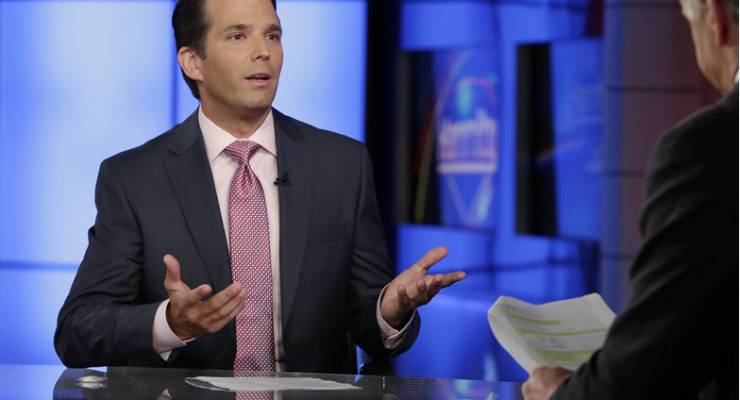
Another day, another scandal for the Trump presidency. This time Trump’s son, Donald Trump Jr, has been caught red-handed working with a Russian agent in an attempt to assist his father’s campaign to become president. The question is whether any electoral laws have been broken or whether this was simply an attempt to break a law that ultimately failed.
One big, as yet unanswered question, is what Donald Trump knew about the matter at the time. To date, Trump has denied knowledge of his campaign team’s work on matters that could imply personal impropriety.
The offer to Trump Jr was via a music promoter Rob Goldstone, who arranged a meeting with Russian lawyer Natalia Veselnitskaya “to provide the Trump campaign with some official documents and information that would incriminate Hillary and her dealings with Russia and would be very useful to your father”.
Veselnitskaya said she would provide damning information about Donald Trump’s then-presidential opponent Hillary Clinton. The promised information was, according to Goldstone, “obviously very high level and sensitive information but is part of Russia and its government’s support for Mr Trump”.
Trump Jr replied: “If it’s what you say, I love it, especially later in the summer.” Trump Jr said that such a meeting to discuss the “sensitive information” would probably include Trump election campaign head Paul Manafort and Trump’s son-in-law and now senior presidential adviser Jared Kushner.
While the information provided was generic and of no value to the campaign team, the question has been raised as to why the offer, which contravened US campaign laws, was not flagged with US authorities. That is a political problem, but is not likely to be an end in itself.
It has also been suggested — in relation to previous allegations of the Trump campaign team having worked with Russian agents to influence the outcome of the election — that working with an agent of a foreign government to subvert the US political process could constitute sedition. This is a vastly more serious matter but one that would be more difficult to make stick, given there appears to have been intent but not an outcome.
Under US law, in relation to “treason, sedition and subversive activities”, Trump Jr’s activities would have to be proven to be intended, in co-operation with another person, to “prevent, hinder, or delay the execution of any law of the United States”. If charged and found guilty, such an offence would carry a minimum penalty of five years’ imprisonment.
What the email trail demonstrates is — if not sufficient material to charge Trump Jr, and potentially Paul Manafort and Jared Kushner — a willingness to explore illegal options to help ensure Trump’s subsequent electoral victory. This action — part of a pattern of behavior unprecedented in US political history — goes to the probity of the Trump administration.
The Trump administration was already under a cloud over national security adviser Mike Flynn’s resignation for having lied about meeting with the Russian ambassador to the US.
Questions of probity, or the moral suitability of a person to be president, can be grounds for impeachment. This, however, would require both the US House of Representatives and the Senate agreeing on such an impeachment.
With both houses controlled by the Republicans, such a move would require some Republicans crossing the floor to vote with Democrats. Alternatively, the Republican Party could decide to ditch a president it sees as a liability ahead of the US Congressional mid-term elections, due in November next year.
As with Trump’s elections, and his actions since becoming president, it would be unwise to guess at where this maelstrom of controversy will lead. But, at a time when Trump announces that the US will collaborate with Russia over cybersecurity and then withdraws the proposal within 24 hours, and set against a growing catalogue of presidential and personal controversies, this latest scandal has reached a new degree of seriousness.
As Republicans ponder what to do with Trump, the biggest issue in the coming months is the extent to which his alienated, disenfranchised support base remains intact. Trump’s supporters appear to be locked in, disinterested or unmoved by scandals that many see as just shaking up the establishment.
Even Trump’s war with much of the US media is having little impact, with many voters having turned away from mainstream news and information sources. The Republican Party is unlikely to risk alienating that voter base, the hostility of which could come back to bite it.
But should polling show a continuing trend that Trump is losing support in the rust-belt areas that delivered his presidential victory, the “establishment” Republicans could turn on him and elevate Vice President Mike Pence in his place. All of this remains some way off but, for those who enjoy political theatre, this particular tragicomedy looks as though it has not yet exhausted its stock of shocks, laughs and outrage.
The carnival that is the Trump presidency rolls on, wheels perhaps starting to come off, but not quite yet at the point of crashing.
*Damien Kingsbury is Deakin University’s Professor of International Politics








Crikey is committed to hosting lively discussions. Help us keep the conversation useful, interesting and welcoming. We aim to publish comments quickly in the interest of promoting robust conversation, but we’re a small team and we deploy filters to protect against legal risk. Occasionally your comment may be held up while we review, but we’re working as fast as we can to keep the conversation rolling.
The Crikey comment section is members-only content. Please subscribe to leave a comment.
The Crikey comment section is members-only content. Please login to leave a comment.